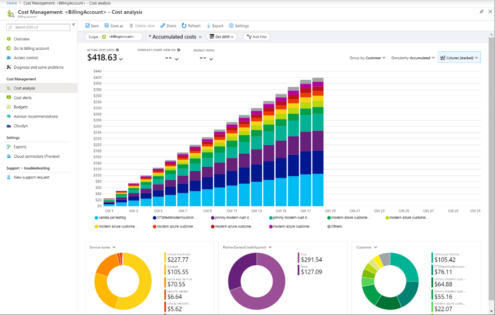You don’t need to be a cloud expert to understand how much cloud costs. It’s right there on your credit card bill, staring you in the face. Your cloud payment has come back around, and guess what, it’s even higher than last month. You’re probably thinking to yourself:
- What are those people in IT doing?
- Who authorized these expenses?
- What value is this to us?
- How are we making money off this?
If this sounds like your unending Groundhog Day, you’re in the right place. FinOps can help not only answer these questions but also establish guardrails to drive accountability and value in cloud environments.
The Shift from CapEx to OpEx
Before cloud, it was common for IT infrastructure to be located on-premises. These costs were classified as capital expenditure (CapEx), and IT teams had to get buy-in from finance and other executives before making purchases. Although this process slowed down organization’s rate of change, it allowed for checks and balances between different teams. IT couldn’t go out and buy a new server if finance determined it wasn’t in the budget or if ownership didn’t see the value.
Cloud adoption changed this dynamic entirely. Capital expenditure on-premises shifted to operational expenses (OpEx). With public clouds like Azure, whose pricing models are based on consumption, if IT wants something, they don’t necessarily have to ask for it. Now that oversight into these expenses have been decentralized, IT admins are commonly able to simply log into their cloud portal and start spinning up resources.
Although this approach makes scaling and managing cloud environments quick and easy, the unintended consequence of this is that those in the procurement department, in finance, and other leads have lost the control and insight they used to have with the CapEx model outside of the cloud fees on the credit card bill.
The Role of FinOps
For those who don’t consider themselves very technical, understanding cloud pricing models can seem like an overwhelming challenge. This is where Financial Operations (FinOps) comes in. FinOps can deliver automated insights into cloud expenses to these decision-makers in near real-time, but more importantly, establish guardrails to help drive accountability. Ultimately, the goal of Financial Operations is to bring together stakeholders from across the business to answer the following questions:
- Why is that cloud service there?
- What is the value of this service?
- How is it driving revenue?
Spending money isn’t always a bad thing. A good CFO knows that, often, you need to spend money to make money. But a great CFO knows to question the value of certain expenses. FinOps can easily be applied to Azure by leveraging inherent tools including Cost Management, Azure Policy, and Azure Advisor to help stakeholders budget their current spend, develop expense forecasts, enforce resource management guardrails, and optimize their cloud spend.
Leveraging Azure Tools
To determine the value cloud resources are bringing to an organization, leaders should start by understanding their cloud spend beyond the numbers. Azure Cost Management gives stakeholders the ability to analyze their costs through built-in smart views and use metadata like resource tagging to group spending by business teams and groups. The real power of Cost Management comes from the custom views that leaders can develop and are tailored to their business. Once a baseline has been established, organizations can create budgets in Azure to drive awareness and proactively address any concerns related to current or forecasted cloud costs.
Azure Cost Management Analysis Reports

Budgets also can also shut down resources if cloud spend reaches a pre-defined threshold. Although this might be helpful for development, test, and other non-critical resources, leaders should look for other ways to optimize cloud expenses before allowing budgets to start shutting down mission-critical workloads. This is where Azure Advisor can really make an impact in reducing waste in cloud environments. Azure Advisor provides recommendations in real-time related to cost, security, reliability, performance, and overall operational excellence.
Tagging Azure resources is not only a great way to drive insight into cloud expenses, but also maintains accountability for cloud services. Tags can be applied to new or existing resources to help identify if a service belongs to a particular business unit, cost center, project, application, or an owner. To enforce the use of tagging in Azure, leaders can use Azure Policy to audit the environment and uphold FinOps guardrails. For example, Azure Policy can be set to deny the creation of an Azure resource if a tag is not applied. Azure Policy could also tag resources automatically based on the subscription and resource group they’re deployed in.
Commit to FinOps Today
Organizations that commit to FinOps in Azure and start leveraging inherent tools like Azure Policy, Azure Advisor, and Cost Management will quickly gain the necessary insights they need not only to optimize their monthly spend, but drive growth. In a landscape where decentralized finance management across departments is common, being able to determine the value of certain resources is a cornerstone of success. FinOps drives accountability and proactively communicates current and forecasted cloud spend in near real-time.
Reservations and Azure Hybrid Benefit (AHB) discounts are quick wins that can start saving organizations money in the cloud right away. But these quick wins don’t address the deeper issues that many of these business face related to managing their cloud costs. FinOps will unlock your organization’s potential to grow and thrive in the cloud.
To learn more about the advantages of FinOps in Azure or RSM’s other Cloud solutions, click here or contact me at ken.osterhaus@rsmus.com. Those who are current customers can submit requests through the DASH Customer Service portal.

 RSMUS.com
RSMUS.com